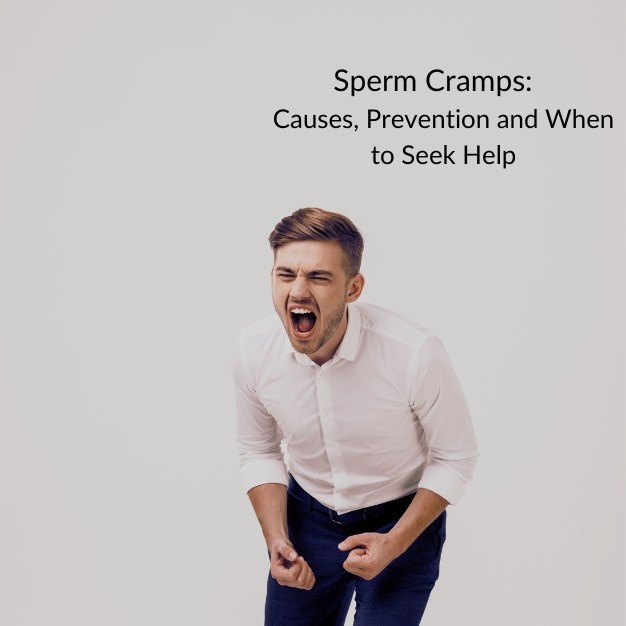Introduction
Experiencing pain or discomfort after ejaculation can be concerning for many men. Often referred to as "sperm cramps," this condition can cause distress and impact sexual health. While occasional discomfort may not be alarming, persistent or severe pain should not be ignored. In this article, we explore the causes of sperm cramps, ways to prevent them, and when to seek medical help. For expert guidance, visit New World Fertility.
What Are Sperm Cramps?
Sperm cramps refer to pain or discomfort experienced in the testicles, prostate, or pelvic area during or after ejaculation. The sensation may vary from mild discomfort to sharp or throbbing pain. Understanding the underlying causes can help determine the best course of action for relief.
Common Causes of Sperm Cramps
1. Prostatitis (Inflammation of the Prostate)
Prostatitis is a common cause of post-ejaculatory pain. This condition, caused by bacterial infections or chronic inflammation, can lead to discomfort in the pelvic region, perineum, and lower back, especially after ejaculation.
2. Pelvic Floor Muscle Tension
Tight or strained pelvic floor muscles can contribute to sperm cramps. Stress, poor posture, or excessive sexual activity may trigger tension in these muscles, leading to pain after ejaculation.
3. Epididymitis (Inflammation of the Epididymis)
The epididymis is a coiled tube at the back of the testicle that carries sperm. Infections or inflammation in this area can cause testicular pain, which may intensify during ejaculation.
4. Seminal Vesiculitis
Inflammation of the seminal vesicles, which produce seminal fluid, can result in discomfort after ejaculation. This condition is often linked to infections and can cause lower abdominal or pelvic pain.
5. Nerve Irritation or Compression
Nerve compression in the pelvic region or lower spine can lead to referred pain in the testicles or groin, mimicking sperm cramps.
6. Varicocele (Enlarged Veins in the Scrotum)
A varicocele is an enlargement of the veins in the scrotum, similar to varicose veins. It can cause discomfort and a heavy sensation in the testicles, especially after sexual activity.
7. Retrograde Ejaculation
In some cases, sperm cramps may be linked to retrograde ejaculation, where semen flows back into the bladder instead of exiting through the urethra. This condition can be associated with diabetes or certain medications.
Prevention and Lifestyle Changes
While not all causes of sperm cramps can be prevented, adopting healthy habits can reduce the risk of discomfort. Here are some preventive measures:
Maintain Good Hydration: Staying well-hydrated helps flush out infections and keeps the urinary and reproductive systems healthy.
Practice Pelvic Floor Exercises: Strengthening and relaxing the pelvic floor muscles through Kegel exercises can help prevent tension-related pain.
Avoid Prolonged Sitting: Sitting for extended periods can put pressure on the pelvic region, leading to discomfort.
Manage Stress: Chronic stress can lead to muscle tension, which may contribute to sperm cramps.
Practice Safe Sex: Using protection and maintaining good hygiene can reduce the risk of infections that cause inflammation.
Limit Alcohol and Caffeine: Excessive consumption of alcohol and caffeine may contribute to pelvic discomfort.
When to Seek Medical Help
While occasional mild discomfort may not be a cause for concern, persistent or severe pain after ejaculation should be evaluated by a healthcare provider. Seek medical attention if you experience:
Pain lasting more than a few hours after ejaculation
Swelling, redness, or tenderness in the testicles
Difficulty urinating or blood in semen
Fever or chills, which may indicate an infection
Chronic pelvic pain that affects daily life
Treatment Options for Sperm Cramps
The treatment for sperm cramps depends on the underlying cause. Some common treatment options include:
Antibiotics: If an infection is causing inflammation, antibiotics can help resolve the issue.
Pain Relievers: Over-the-counter pain relievers like ibuprofen can help manage discomfort.
Pelvic Floor Therapy: Physical therapy focused on the pelvic floor can help relieve muscle tension.
Lifestyle Modifications: Adjusting sexual activity, improving posture, and reducing stress can prevent recurring symptoms.
Medical Procedures: In rare cases, conditions like varicoceles may require surgical intervention.
FAQs About Sperm Cramps
1. Are sperm cramps normal?
Mild discomfort after ejaculation can be normal, but persistent or severe pain may indicate an underlying issue and should be evaluated by a doctor.
2. Can stress cause sperm cramps?
Yes, stress can lead to muscle tension in the pelvic region, which may contribute to post-ejaculatory pain.
3. How can I relieve sperm cramps at home?
Practicing pelvic floor exercises, staying hydrated, avoiding prolonged sitting, and managing stress can help relieve mild symptoms.
4. When should I see a doctor for sperm cramps?
If you experience persistent pain, swelling, fever, or blood in semen, seek medical advice promptly to rule out infections or other serious conditions.
5. Can sperm cramps affect fertility?
While sperm cramps themselves do not directly affect fertility, underlying conditions like infections or varicoceles could impact reproductive health.
Conclusion
Sperm cramps in men can be caused by various factors, ranging from infections to muscle tension. While mild discomfort may not be concerning, persistent or severe pain should not be ignored. By adopting healthy habits and seeking medical attention when necessary, men can maintain their reproductive health and prevent long-term complications. If you experience ongoing pain after ejaculation, consult a fertility specialist at New World Fertility to get personalized guidance and treatment options.

 Apr-16-2025
Apr-16-2025